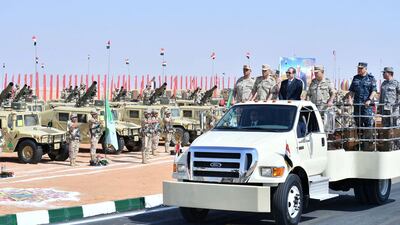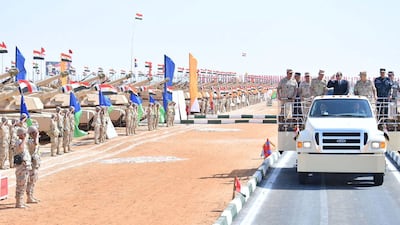The outcome of Egypt’s presidential election may well be a foregone conclusion, yet next week's vote is set to be long remembered for the tough and trying times in which it will be held.
Running against three little-known politicians, soldier-turned-president Abdel Fattah El Sisi is widely expected to secure a comfortable win to keep him in office until 2030.
But cruising to victory is unlikely to be enough during a continuing economic crisis and after the Israel-Gaza war broke out in October.
Mr El Sisi’s campaign is said to be focused on persuading voters to head to the polls in large numbers to give him a convincing mandate for painful foreign and domestic policy decisions.
His three challengers – Farid Zahran, Hazem Omar and Abdel Sanad Yamama – are given air time on state and pro-government TV networks to expound their views.
They have also been allowed to hold campaign rallies.
All three have been critical of the government and of policies adopted by the President himself.
But they have refrained from personal criticism of Mr El Sisi in campaigns marked more by politeness towards the frontrunner than voters might expect in an election.
In any case, the election has been overshadowed in the minds of Egyptians by the Gaza war and the nation’s economic woes, giving rise to speculation the turnout may be embarrassingly low.
Both issues have pushed people into a state of anger and despair chiefly reflected in a flood of social media posts airing hatred for Israel, support for the Palestinians and, in some cases, criticism of the government.
Of particular concern to Egyptians is the tragically high death toll among Gaza’s Palestinians – more than 16,200 so far – and the humanitarian crisis there.
Authorities allowed a few pro-Palestinian protests during the early stages of the war but clamped down after one rally turned against the government.
Protesters sought to occupy Cairo’s Tahrir Square, the centre of a 2011 uprising that forced autocratic ruler Hosni Mubarak to step down after 29 years in power.
The vote also comes at a time when Egypt’s national security is under threat from the continuing political divisions and rivalries in Libya, its neighbour to the west.
There is also the war in Sudan, Egypt’s southern neighbour, where the army and a powerful militia have been fighting for nearly eight months in a war that has devastated the vast and impoverished country and displaced millions.
About 300,000 Sudanese have fled to Egypt since the conflict began in April.
That Egypt is now surrounded by nations that are either at war or deeply unstable has given Mr El Sisi’s supporters one more reason to declare him the best man for the highest office.
Only a leader with military background can handle Egypt’s multitude of challenges, his supporters say in many of the thousands of pro-El Sisi posts on social media.
Egypt’s woes could worsen, say analysts.
Israel’s relentless bombardment of Gaza and its offensive in the strip’s southern region is leaving the territory’s 2.3 million residents with rapidly shrinking space to seek refuge.
That is raising fears that hundreds of thousands of Palestinians could storm across the border and into Egypt’s Sinai Peninsula in search of safety.
Egypt has repeatedly said that forcing Gaza’s Palestinians into Sinai would end the Palestinian cause.
Sounding tough on an issue about which most Egyptians feel strongly, Mr El Sisi has repeatedly said that forcing the Palestinians into Sinai is a “red line” and warned against mistaking for weakness his “calm demeanour” when speaking on the issue.
It may be too soon to judge whether his hardline rhetoric on Israel – he describes its actions in Gaza as collective punishment and inhumane – would satisfy a nation where resentment of Israel and anti-western sentiment are at a level not seen since the two former enemies signed a peace treaty in 1979.
Egyptian officials told The National that Cairo had received assurances from the US, Israel’s closest ally and chief backer, that a forced migration of Palestinians into Egypt will not happen.
But there are doubts that such assurances are enough.
“The trajectory of the war in Gaza might put such assurances under pressure,” Michael Hanna, director of the US programme at the International Crisis Group think tank, told The National.
“If the war goes the way it’s been going, the border between Egypt and Gaza will come under immense pressure. Reality might have a say then."
What comes next at home after the election will be equally daunting, as Egypt’s leader will have little choice but to meet the International Monetary Fund's conditions for more financial support.
Already, disbursement of a $3 billion support package agreed to with the IMF in December last year has been halted after Egypt fell behind on its pledges to adopt a flexible exchange rate – or devaluation – and to pull the state and the military back from their dominant position in the economy.
But it will not be easy to walk back from the edge of an economic abyss.
The world’s three major rating agencies – Moody's, S&P and Fitch – all recently downgraded Egypt's sovereign debt further into junk territory.
In its October 20 downgrade, S&P said it believed the presidential election could create political space for economic reforms, including a currency devaluation.
Fitch, in a November 3 downgrade, said it expected privatisation to accelerate, costly mega projects initiated and overseen by Mr El Sisi to slow down, and the currency to be adjusted after the election.
A persistent shortage of hard currency is suppressing imports of essential commodities and hurting industries that rely on foreign materials.
An industrialist who makes fabrics exclusively for export to North America has complained that the crunch is stopping him importing raw materials, although the business has enough foreign currency funds.
“In our case, it is unusual and it’s scaring us," the industrialist said.
"We earn foreign currency and as such we should have no problems at all using it to import material. I think they are just trying to keep dollars longer by slowing down the process."
After three devaluations since March last year, the Egyptian pound is traded on the black market at about 40 per cent weaker than the bank rate of about 31 pounds to the dollar.
Inflation is about 35 per cent, dealing a blow to middle and working-class Egyptians who had already been struggling before the economic crisis hit early last year.
A senior international banker in Cairo said a post-election devaluation may not hit so hard because most goods and services have for months been priced on the basis of the black-market rate.
It hit 50 pounds to the dollar this month but more recently climbed back up to about 45 to 46 pounds.
But Mr Hanna says Egypt’s efforts to ease the suffering of the Palestinians in Gaza and its handling of the Sudan war has created a measure of goodwill from its US, European and Gulf Arab allies, which could translate into an economic rescue package.
“This is a vulnerable moment for Egypt and there’s probably a little more understanding for Egypt’s predicament,” he said.









